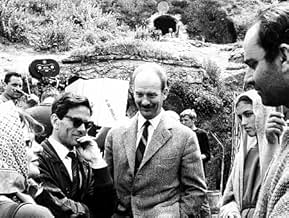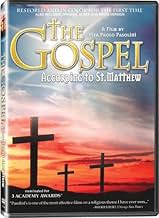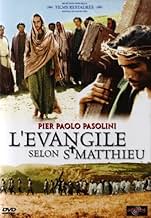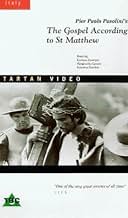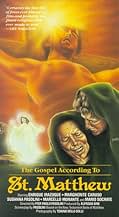Das Leben von Jesus Christus nach dem Matthäusevangelium. Pasolini zeigt Christus als Marxisten avant-la-lettre und nutzt daher den halben Text des Matthäusevangeliums.Das Leben von Jesus Christus nach dem Matthäusevangelium. Pasolini zeigt Christus als Marxisten avant-la-lettre und nutzt daher den halben Text des Matthäusevangeliums.Das Leben von Jesus Christus nach dem Matthäusevangelium. Pasolini zeigt Christus als Marxisten avant-la-lettre und nutzt daher den halben Text des Matthäusevangeliums.
- Regie
- Drehbuch
- Hauptbesetzung
- Für 3 Oscars nominiert
- 7 Gewinne & 9 Nominierungen insgesamt
- Caifa
- (as Rodolfo Wilcock)
Empfohlene Bewertungen
Pasolini's minimalist Jesus has an air of both humility and loftiness (as befitting one able to walk on water), but he is conspicuously lacking in emotion and expression. One might reply that Jesus (as God) doesn't share all our roller coaster emotions, but I see the New Testament Jesus as more of a Hamlet character, full of contradictory emotions. Pasolini's Jesus character's foreboding presentation could almost be seen as that of a young, conceited, dour, nihilistic Sophomore Philosophy student. A few quibbles: the Bible text describes large crowds of people following Jesus, but the movie only allows for a couple of dozen in most scenes. Also, in the movie, Jesus is often represented as preaching while he is walking, with his back turned away from his followers, who walk behind him. Finally, Mary the mother of Jesus is at most 20 when he is born, but she somehow becomes 70 years old during his ministry, when in fact she would have been only 50. With these reservations, then, I consider this the most successful Bible film I've seen.
Jesus and his 12 followers are a group of involved young men, who champion for revolutionary concerns. The youth and inexperience of the actors gives a fascinating sense of the fragility of the Christian movement itself in its very beginnings. The iconic-like closeups are a reminiscent of medieval, religious pictures whereas Enrique Irazoqui, who plays Jesus, seems like as if he descended right from a El Greco painting with his thin figure and slim, long face. The music from Bach and Mozart, as well as Blues recordings conveys additional meaning: The cry of revolt and the demand to be heard and received by the people and its authorities. It becomes utterly touching when the film dissolves into melancholy and passion by the power of Bach's classical music chorus and the blues.
The cinematography is remarkable and takes in many scenes the position of a third person telling the story. The intensely textual and dramaturgic reference to the biblical model, the amateurish performances of the actors and the waive of any pathos gives the film a strong naturalistic nuance. Jesus is less the son of god, but more an ideological fighter who gives radical speeches. But, Pasolini does not demystify the figure of Christ, nor does he question the set dogmas of the official church. He rather accentuates the social facets of Jesus' life and work and gives it an unforeseen political smack
This is such a stately, respectful, yet contemporary (and dare I say, Italian) production, in quiet black and white, it's hard to find fault with it. In some ways, I think it does exactly what it intends. It mixes long shots with close ups. It moves with clarity and sharp (no dissolve) cuts from face to face. It uses African-American gospel and Bach. It depends on solemnity, and it uses actors that have the faces, and demeanors, to be utterly solemn and strong.
All the actors are amateurs. Pasolini was an atheist. The triumph at the end is a matter of record. It's all here.
The question might be (for some) whether it is nevertheless a movie you want to watch. And I say, absolutely. You do have to like, or learn to like, movies that are about quiet ambiance, about passive expressions that say more than intense extroverted acting. The black and white photography, something of a throwback during this early 1960s production, gives it even more of the timeless, almost melancholy depth that keeps it going, owing something to the Dreyer's Joan of Arc, I think.
It's important to know this is not really an interpretation of the gospel, but a reading of it. The filming of course required actors, but it tries to be factually straight forward. That's incredibly hard to pull off without arrogance or religiosity. But Pasolini does it. The down side to this is that it's slow, or even (no sacrilege here), boring. I mean, I read the book.
For me, what makes it terrific is not only how it is filmed (the camera-work and editing) and the faces (all those faces, with the camera still and focused on them), but the sense of reality here. The holiness is removed, but not the sacred seriousness. It makes it seem possible in a very real way. The people, the places, all of it is not historic, not in particular, but the effect, the mood, the force of it all is profound. Even for a non-believer. It's quite something to get swept into.
First - it contains perhaps the most powerful piece of MUSIC I ever experienced in a movie. I've never forgotten my utmost impression from that music when I saw the movie for the first time in a film-club some twenty-five years ago. From a total silence of the first titles, a music like an avalanche of a heavenly army hitting the soul ...
Which music it was? MISA LUBA! An incredible polyrithmic blend of three ingredients: a high melodic church chorus of Kenyan women, plus an unbelievably improvising african singer, plus a bunch of African drummers... everything locked together by an unrepeatable moment of inspiration and chance. I could not imagine some most powerful music to underline the most exposed passages of Jesus' story. Curiously and sadly enough, this MISA LUBA is even not credited in the movie titles, in contrast to a fair (but much more standard) classic music used in most of the movie. It was just this happy usage of MISA LUBA which contributes most to the soul and mood of the Pasolini film. It is also well understandable why Pasolini used an eclectic mixture of music from various continents, -- in an obvious intention to make the universal story yet more UNIVERSAL, across the nations and cultures.
Second happy aspect of Pasolini's interpretation is his cast of characters, his choice of believable and interesting types ... for Jesus, for Maria, and most other characters. These are believable and convincing types of people from the middle-east. How superior and fair is here Pasolini in comparison with all those funny blue-eyed and polished Hollywood casts of those pseudo-biblic stories ...
And third - Pasolini did very well to make the movie in black-and-white. It contributes to a mystical, spiritual and abstract atmosphere of the opus. In my opinion, it would be hardly possible to make this movie well in color.
And yes, I agree with those who say that practically all other movies about Jesus and those biblic stories are fundamentally wrong, and in cases of those (in)famous Hollywood versions - even funny to tears.
This Pasolini's opus is very honest and might be the 'very best film interpretation of Jesus' story.
Wusstest du schon
- WissenswertesPier Paolo Pasolini used non-professional actors and cast local peasants, shopkeepers, factory workers, and truck drivers. For Mary at the time of the Crucifixion, he cast his own mother Susanna Pasolini.
- PatzerWhen they are taking Christ down from the cross, in the distance you can see a car driving around a corner.
- Zitate
[last lines]
Christ: All authority has been given to me in heaven and earth. Go, therefore. And make disciples of all nations, baptizing them in the name of the Father, and of the Son and the Holy Ghost, teaching them to observe everything I have commanded you. And behold. I am with you always even unto the end of the world.
- Alternative VersionenThe 2007 DVD release features a colorized, English-dubbed version with a run time of 91 minutes and an Italian-language black and white version running 136 minutes.
- VerbindungenEdited into Geschichte(n) des Kinos: Une histoire seule (1989)
- SoundtracksMatthäus Passion (BWV 244)
Written by Johann Sebastian Bach
nr 78: Wir setzen uns mit Tränen nieder
nr 47: Erbarme Dich (musical intro)
Top-Auswahl
- How long is The Gospel According to St. Matthew?Powered by Alexa
Details
- Erscheinungsdatum
- Herkunftsländer
- Sprache
- Auch bekannt als
- El Evangelio según san Mateo
- Drehorte
- Castel Lagopesole, Avigliano, Basilicata, Italien(Sanhedrin trial of Jesus, in castle's courtyard)
- Produktionsfirmen
- Weitere beteiligte Unternehmen bei IMDbPro anzeigen
Box Office
- Weltweiter Bruttoertrag
- 16.572 $
- Laufzeit
- 2 Std. 17 Min.(137 min)
- Farbe
- Sound-Mix
- Seitenverhältnis
- 1.85 : 1


